Community Services
BYRON BAY COMMUNITY SERVICES DEVELOPMENT 1880 – 2015 .
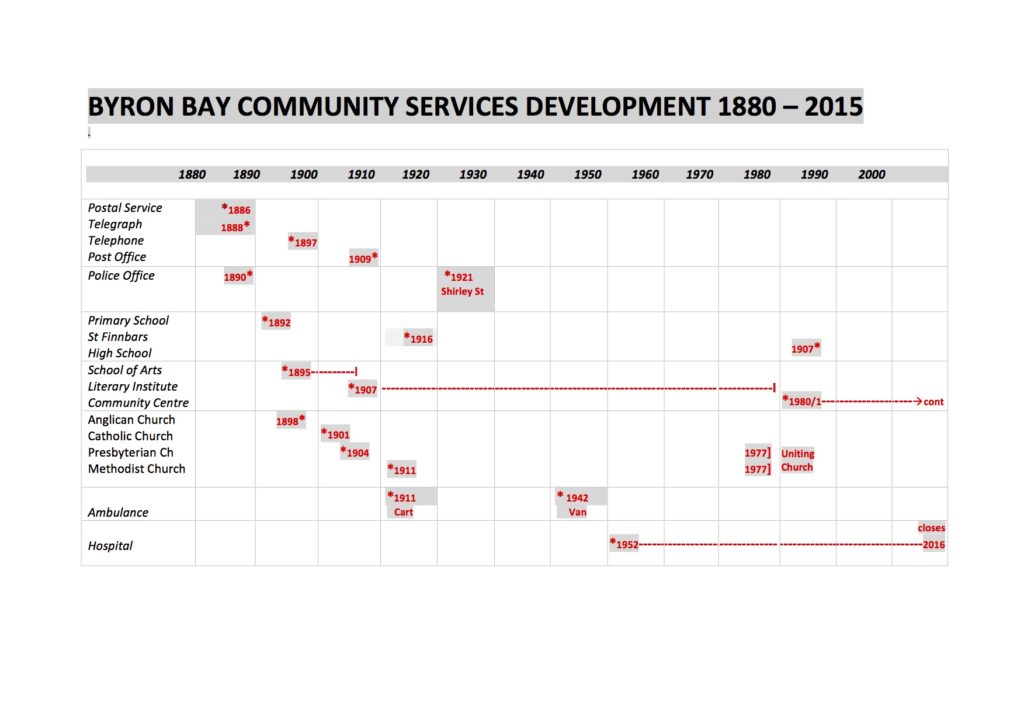
BYRON BAY POST OFFICE
Byron Bay’s first Post Office opened in 1886 as a simple mail receiving and delivering site in an existing store in the town. The incoming mailbags were collected and outgoing mailbags were delivered on horseback once a week either to Ballina or Brunswick Heads. A year later the service had increased to two bags per week with the second bag being delivered by surf boat from the regular steamers which called into the bay before the old jetty was completed. Delivery to the outlying farmers and settlers was still by horseback. Telegraph service was introduced to Byron Bay in 1888. The Post and Telegraph services were amalgamated in 1889 and a new 8m x 4m building was erected and provided rent free to house the two services. By 1895 Money Order Office and Government Savings Bank services were also being provided through the Post Office.
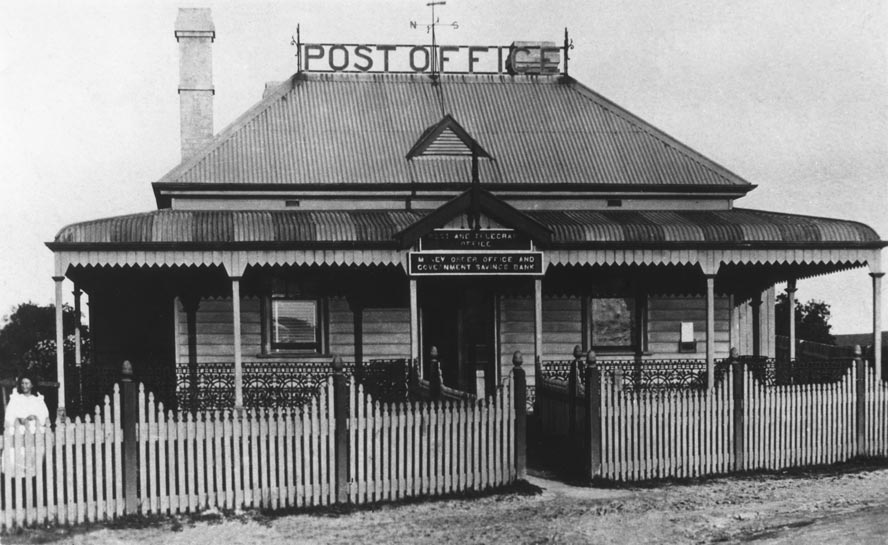
Byron Post and Telegraphic Office shortly after completion in 1897 (Source – EJW – RTRL)
In 1896 a block was made available on Jonson Street to build a new Post and Telegraph Office which was completed and opened in April 1897. In 1909 a telephone exchange was installed in the Post Office and Byron Bay was linked to the world by mail, telegraph and telephone.
That 1897 Post Office building, modified and extended over the years still houses the Byron Bay Post Office service although it only occupies the rear part of the building now. The front of the building is now used for commercial purposes.
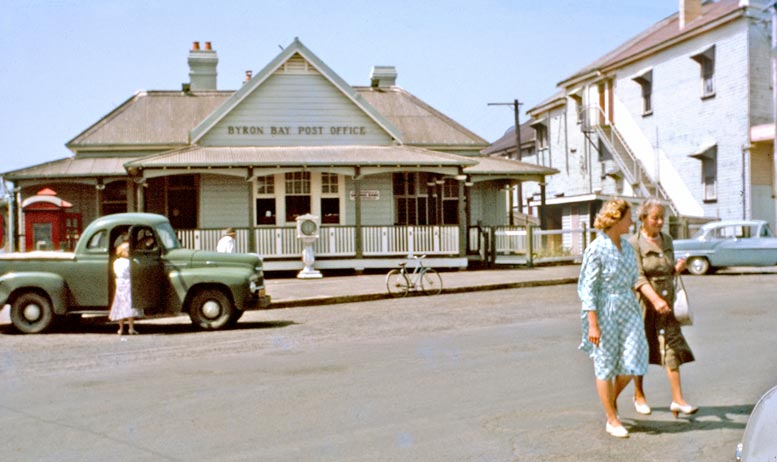
Byron Bay Post Office – 1963 (Source EJW – RTRL)
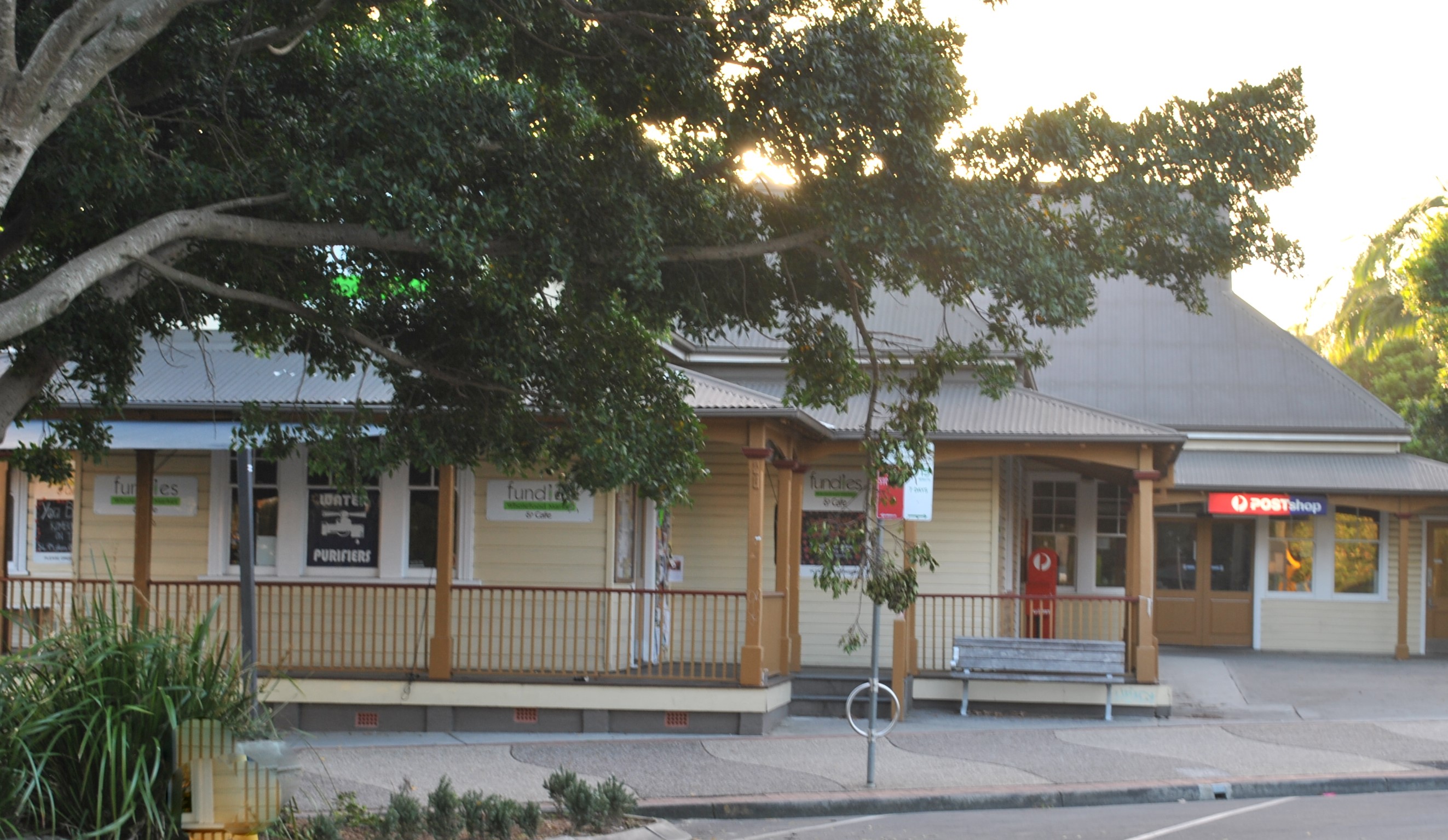
Byron Bay Post Office – 2016 (Source – John Main)
PUBLIC SCHOOLS OF BYRON BAY
The citizens of Byron Bay made their first application for a public school to the NSW State Government in 1890. It was declined. But the local Progress Association persisted and in August 1892 the first public school comprising one class room measuring 6 metres x 5 metres and expected to accommodate 40 pupils had been completed. On opening day 57 children enrolled. Three weeks later the number of children attending had risen to 72! The single classroom was extended three metres to increase the floor space to 6 metres x 8 metres.
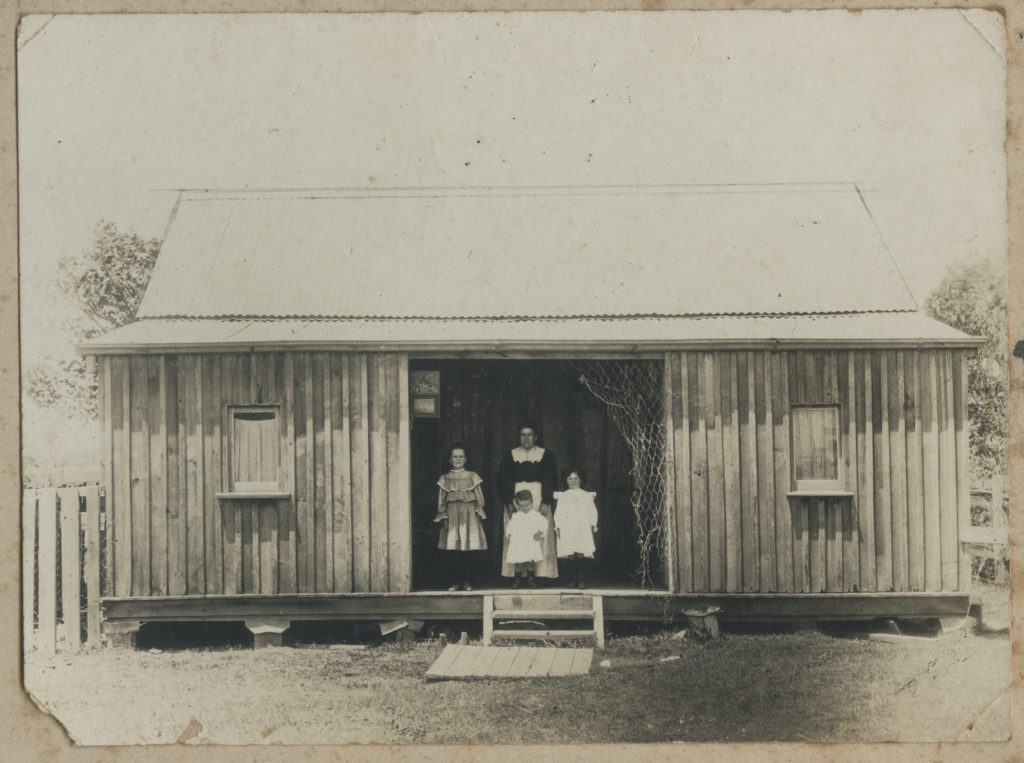
Temporary school (Source – EJW – RTRL)
In July 1897 it was realised that this “temporary” school on a “temporary” site had indeed become permanent and a two acre block with a two and a quarter acre reserve were dedicated for the school and play grounds. This is the block of land on which the Byron Bay primary school is located today.
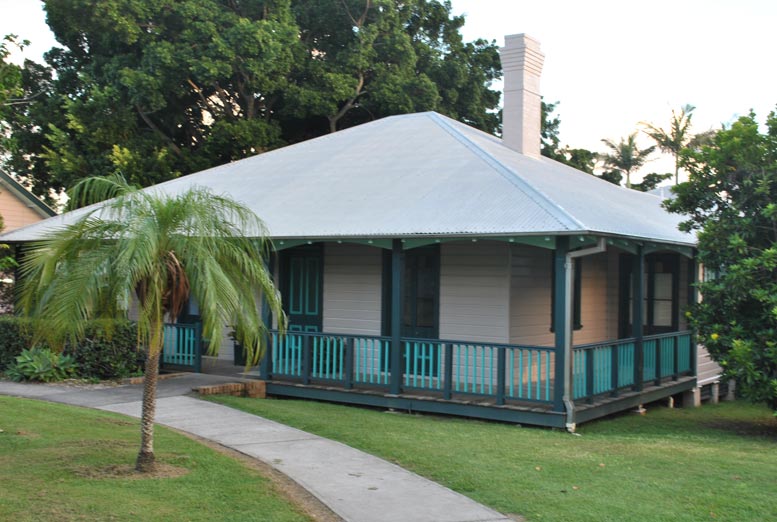
Teacher’s residence built in 1902 and extended in 1950, as it appears today (Source – John Main)
A new class room was opened in time for the start of the 1902 school year and the old building was shifted and converted to a weather shed. By WWI there were four class rooms on site and this increased to eight in 1924.
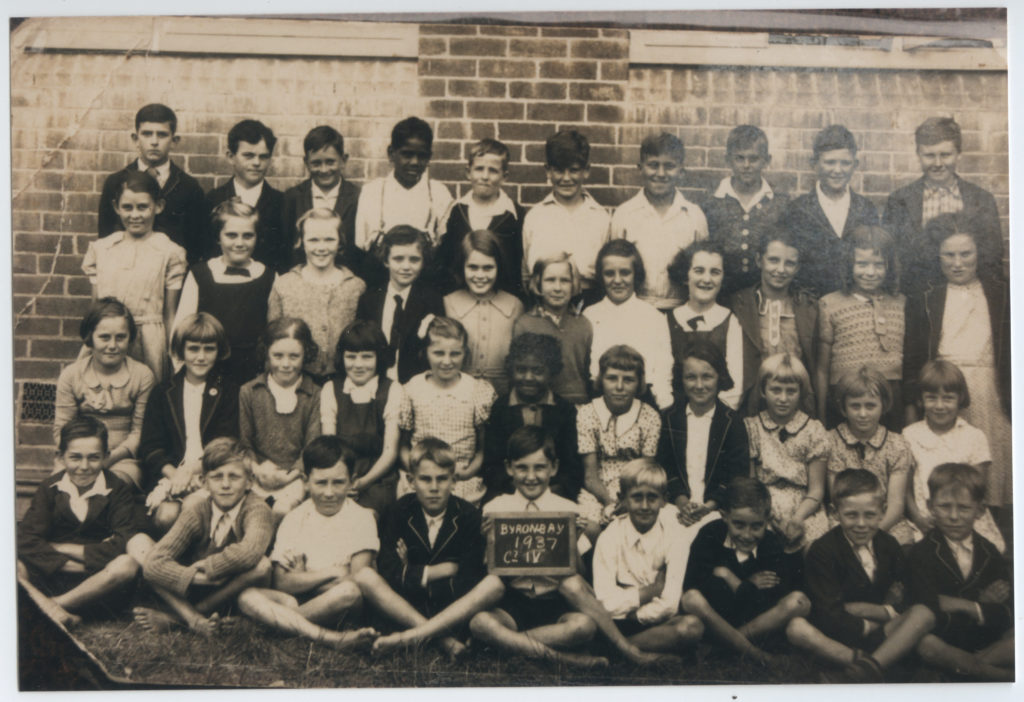
Byron Bay Primary School Class 4 of 1937. (Source – EJW – RTRL)
The number of children attending continued to increase and additional classrooms were added to accommodate them.
Today more than 650 children attend the school.
Up until 1987 when the new Byron Bay public high school was opened older school students mostly travelled to other towns such as Lismore, Mullumbimby or Murwillumbah for their high school education. Now just over 800 students are enrolled at this uniquely designed learning centre.
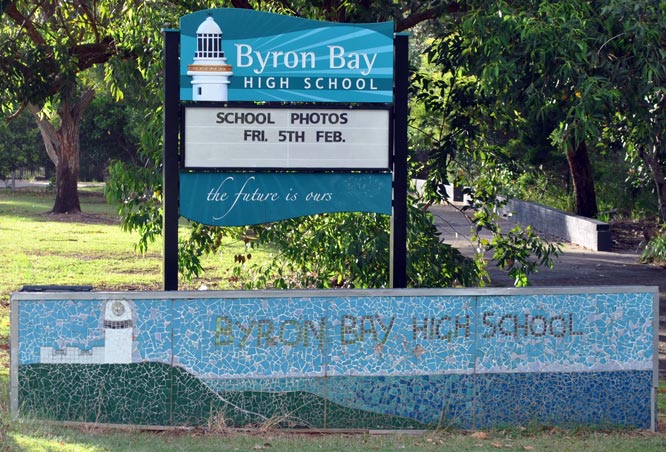
Byron Bay High School 2016 (Source John Main)
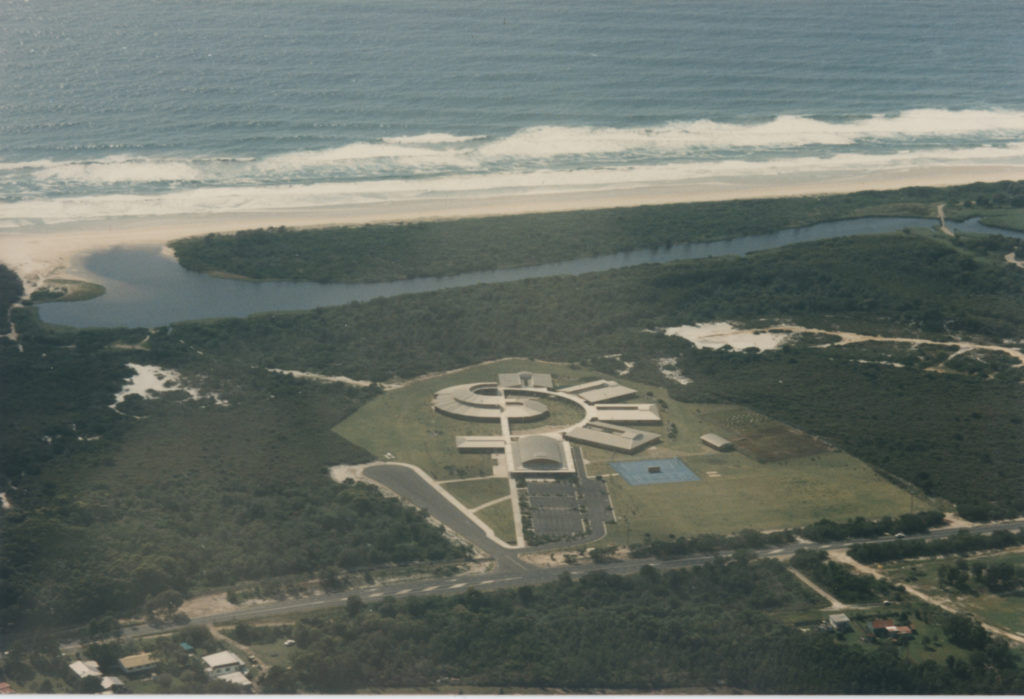
Aerial photo of Byron Bay High School (Source EJW – RTLR)
BYRON BAY COMMUNITY CENTRE AND LIBRARY
The Byron Bay School of Arts, formed in 1894, was allocated a specially designated block of land on Jonson Street stretching south from the Post office to Marvell Street. The initial School of Arts building, which also housed the first public library in Byron Bay, was erected in 1895. Within 10 years it had become too small to accommodate all the activities for which it was being used. It was decided to divide the block of land in two, sell the southern part which accommodated the old building, retain the vacant part of the block next to the Post Office and to erect a new building there.
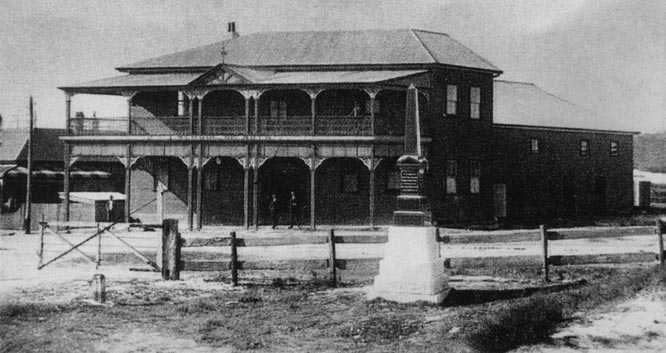
School of Arts Building 1907 shortly after completion. (Source – EJW – RTRL)
The new, much larger, two-story building was completed in April 1907. It quickly became the focal point of the town, containing the expanded library and reading room, a dance hall, billiard room, physical club (gym) and meeting rooms used for doctor’s consultations and church services. Following another name change it became the Byron Bay Literary Institute in January 1913. A skating rink and coffee parlour were installed. The first silent movies were shown in 1917 and became a regular Saturday feature. The “talkies” commenced in 1931 complete with short serialised movies that continued from Saturday to Saturday to lure the local patrons back each week.
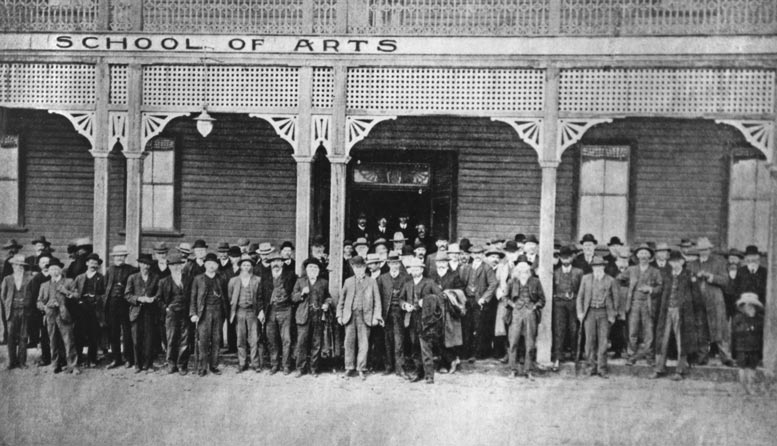
Committee and members after mid-year meeting about 1910. (Source – EJW – RTRL)
The building was remodelled in the mid 1930’s and continued as the hub of the town and showing movies up until the late 1960’s. In 1980/81 the building underwent major repairs and renovations and yet another name change – this time to the Byron Bay Community Centre. However, this no longer included the library service. The original 1907 building was replaced with a new complex in 2002. It includes the Byron Theatre a 246 seat multi-purpose venue from which movies are still shown, nearly 100 years after the first. A multitude of other services are provided from the Community Centre.
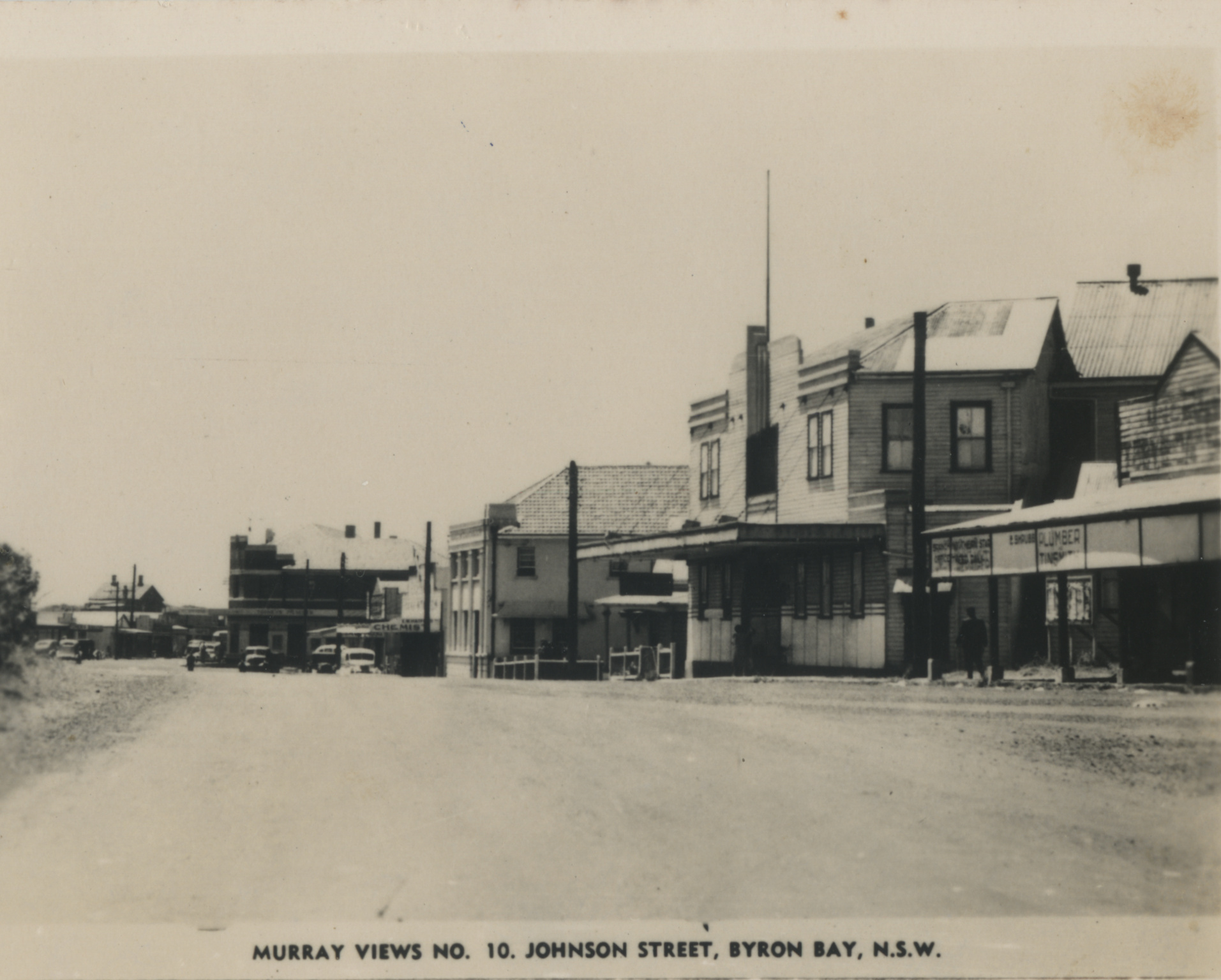
The Literary Institute building in the late 1940’s as a movie theatre. (Source – EJW – RTRL)
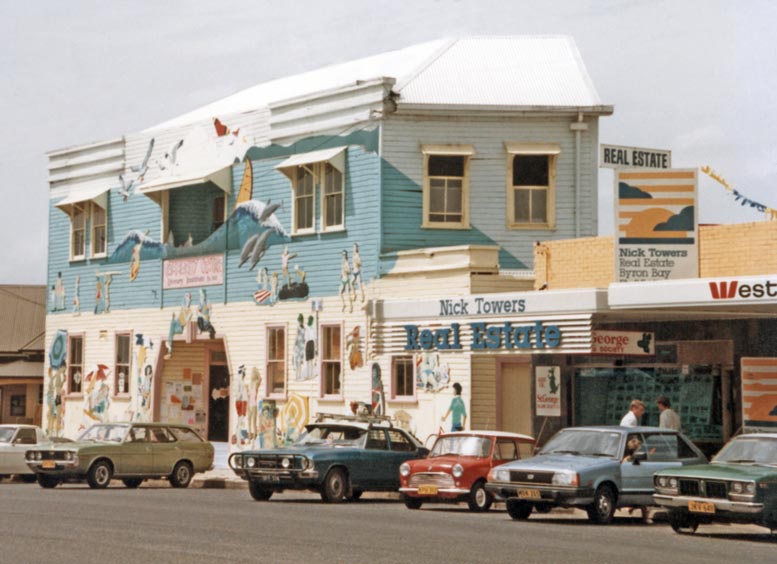
As the Community Centre after 1980-81 renovations. (Source – EJW – RTRL)
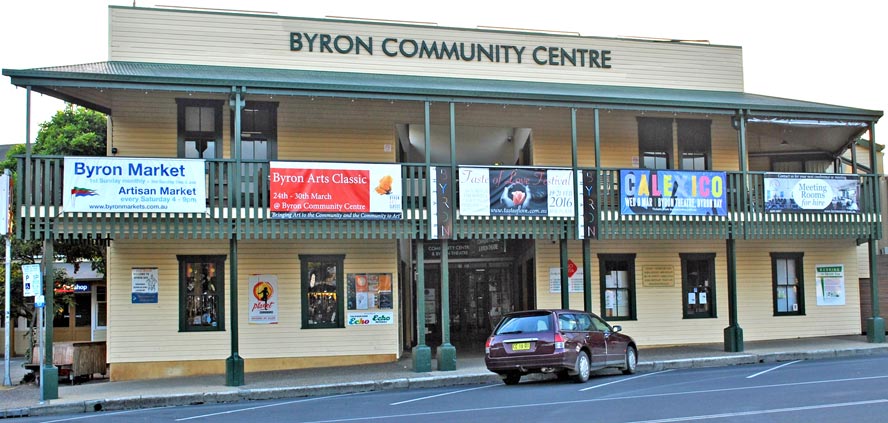
The new Community Centre – 2016 (Source – John Main)
In January 1978 the Byron Bay library became part of the Richmond-Tweed Rural Library Service allowing a much wider range of services to be provided to the community including a mobile home library service. In April 1980 the books and library staff were transferred to a new purpose built facility on Lawson Street adjacent to the Shire Council Building. The library service was provided from those premises until April 1995 when it was relocated to the former Northern Rivers Electricity offices, a small building on the other side of Lawson Street from the Shire Council Building.
But in February 2013, almost a 120 years after the first library opened in Byron Bay, a new building with ancillary exhibition space was completed on the corners of Lawson and Middleton Streets. The services provided match those of any modern library and include access to not just books, magazines, and newspapers but also to DVDs, audio books, the internet world and databases, printing and copying. Valuable local records are archived, authors and writers are given the opportunity to talk about their work at special events, children’s programmes are held and book groups meet. Research facilities, training and assistance are provided.
The early citizens of Byron Bay first demonstrated their enthusiasm for reading and learning from 1894 and today such enjoyment from the new library is shared with the many visitors to Byron.
Byron Bay Library contains a designated room for indigenous research and archival material, as well as a room for Arakwal cultural activities. This was included to recognise the vital assistance the Bundjalung of Byron Bay-Arakwal People played in making the land available for the Library to assist the overall community and to acknowledge the value of our culture to the community.
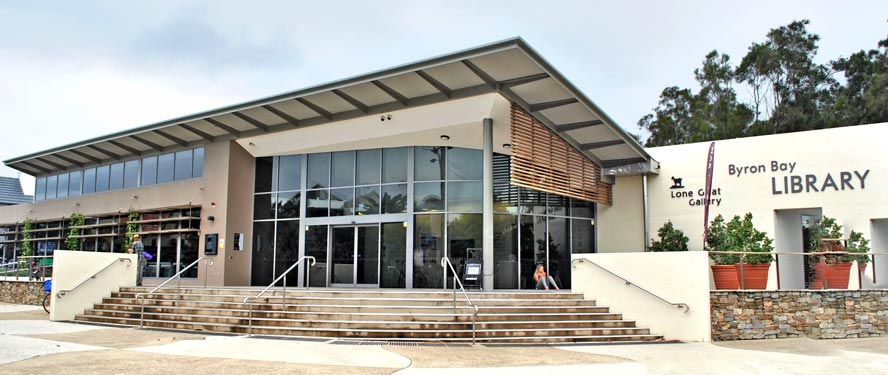
New Byron Bay library opened in 2013. (Source – John Main)
BYRON BAY HOSPITAL AND AMBULANCE SERVICE
Byron Bay was intermittently served by doctors from the late 1890’s through to the end of WWII. At times there were one or more resident doctors; other times Byron shared a doctor with other shire towns and at other times, especially during the first and second world wars, there were no easily accessed medical services. At first doctors consulted from hotel rooms, a room in the Orient Coffee House or the School of Arts and at times from private residences. Seriously injured or very ill patients were transported for treatment to Lismore Hospital, initially by train and from 1942 by the local ambulance. The community made its first attempt to have a hospital built in Byron Bay in 1912. Funds were raised by locals but no support was received from the State Government and the initiative foundered.
The citizens of Byron Bay recommenced lobbying for a hospital to be established in the town in early 1943 and was advised by the State Hospital Commission that the town was one of the possible sites for a hospital to be built after the war. A local Byron District Hospital Board was elected immediately to work with the State Government to get the hospital built and functioning as soon as possible. Land on Shirley Street was vested as a hospital site and the funds plus interest from the 1912 initiative were provided to the new Hospital Board. But as 1946 drifted into 1947 and then 1948 and then 1949 delay followed delay until the local Hospital Board and Byron Shire Council took matters into their own hands and decided to build a “temporary” hospital. This would comprise three buildings; a ward, a nurses quarters and an administration block to be built by Council and to be paid off by rent collected over 20 years. But it took until January 1951 before government permission was given even to do this.
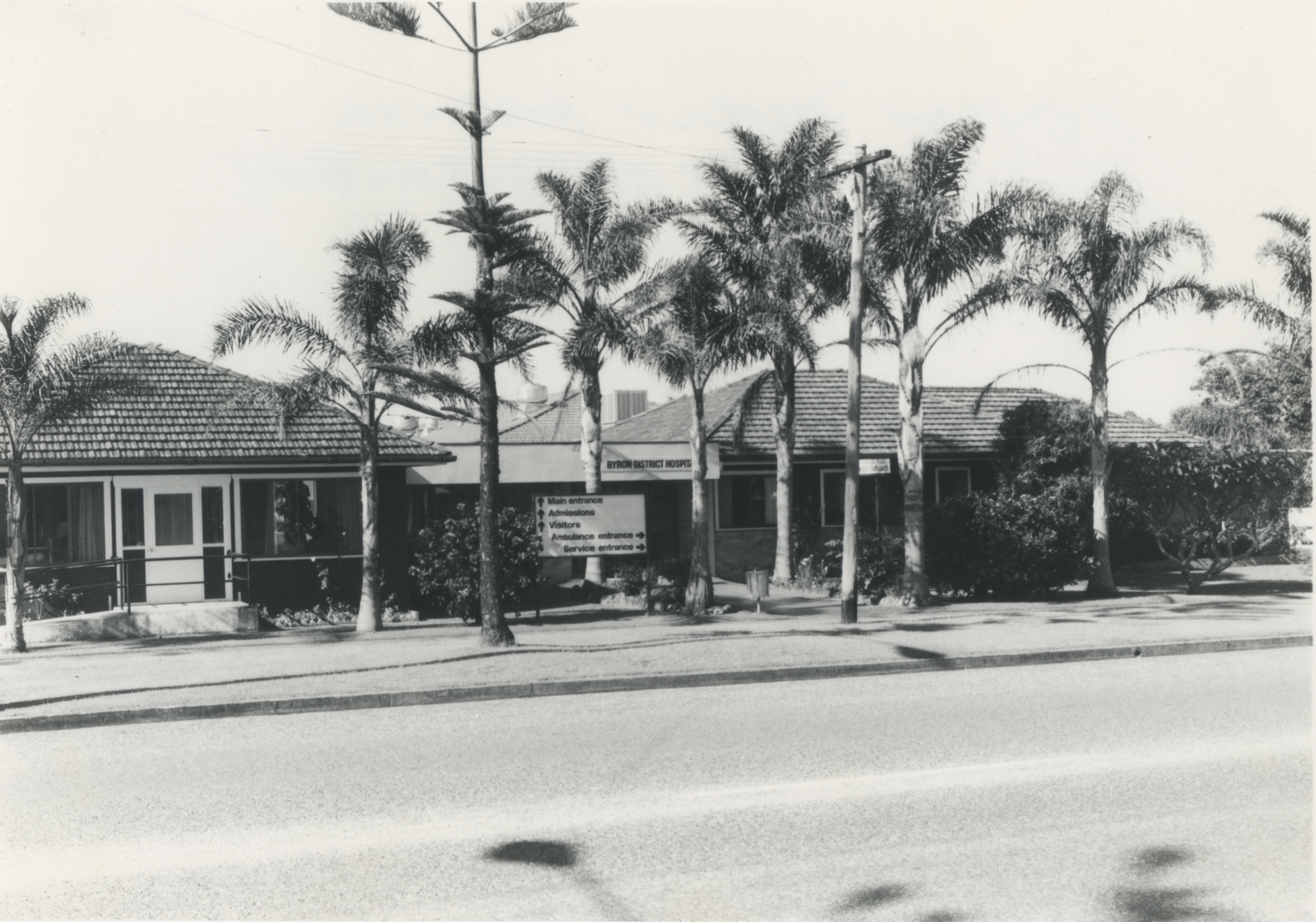
Byron District Hospital (“temporary”) shortly after opening in 1952. (Source – EJW – RTRL)
The “temporary” buildings were completed in April 1952 and officially opened in June that year by the Governor of NSW and so after nine years of struggle and initiative Byron Bay had its hospital. Many of the improvements and much of the equipment was provided by the local Hospital Board, the local Woman’s Hospital Auxiliary or local citizens. The “temporary” hospital was expanded over ensuing years as the demand for medical services increased but the additional buildings were paid for by the State Government. In 1955 an ambulance station was erected on Jonson Street to house the town’s two ambulances. The ambulance service was transferred to new premises on Ewingsdale Road in 2014.
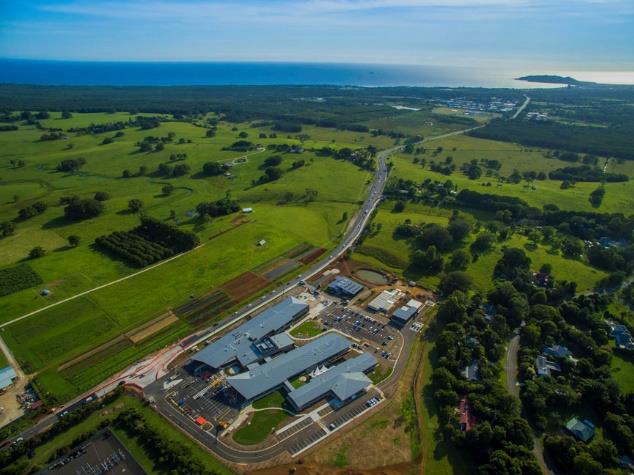
Aerial view of the new Byron Bay Hospital (2016) (Source – Internet)
In 2016 a new Byron District Hospital was opened adjacent to the new ambulance station on Ewingsdale Road. This time the State Government paid for the buildings. So after 64 years Byron Bay’s “temporary” hospital discharged its last patient and closed its doors, permanently.